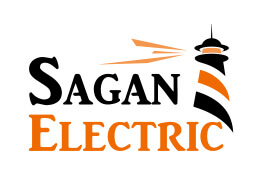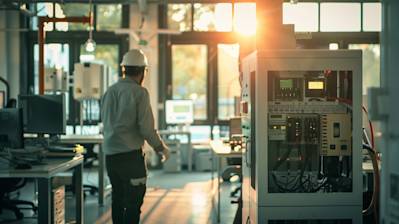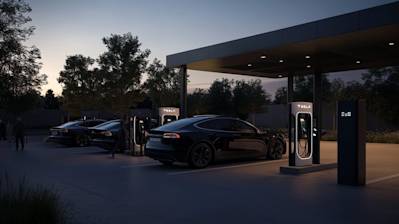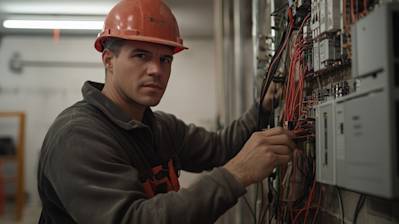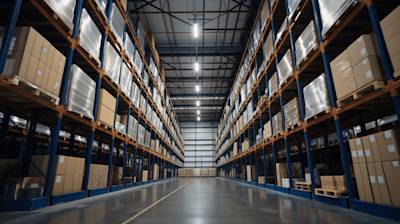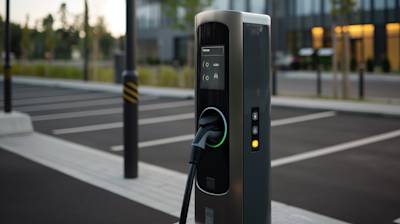The world we live in today heavily relies on electricity. Power interruptions can prove detrimental to businesses, resulting in significant loss of revenue, credibility, and efficiency. For this reason, commercial generators have become an indispensable tool in the modern business setup. This article delves into what these generators are, their benefits, the various types available, and what to consider when shopping for a commercial generator. Buckle up, relax, and let this guide illuminate your path to understanding the crucial role of commercial generators in businesses.
Understanding Commercial Generators
A commercial generator is a piece of equipment designed to provide an electrical backup plan for businesses and large establishments during power blackouts. They are much stronger than residential generators and come in an array of sizes, power output capacities, and fuel types. Commercial generators are designed to provide electricity for a more extended period and withstand the high demand required by commercial buildings, including restaurants, hospitals, offices, retail outlets and industrial warehouses.
The Importance of Commercial Generators
You may wonder why you need a commercial generator for your business. Well, apart from preventing loss of revenue when power blackouts occur, commercial generators also:
- Prevent Data Loss: Power interruptions often result in data loss, sometimes unrecoverable, especially for businesses heavily reliant on digital platforms. Commercial generators ensure seamless continuity.
- Protect Equipment: Sudden electricity cuts can harm your costly business machinery and appliances. The generator provides a continuous power source, thereby protecting your equipment.
- Maintain Business Reputation: Unanticipated power interruptions could impact your service delivery, hence affecting your business reputation. Having a commercial generator guarantees minimal disruptions.
Categories of Commercial Generators
Several factors largely define commercial generators' categorization, such as their purpose, size, configuration, and the type of fuel they utilize. On that note, let's explore the different types of commercial generators.
Diesel Generators
Popular for their longevity and lower operating costs, diesel generators present an apt choice for long-term use. They are sturdy, dependable, and require less maintenance compared to petrol generators.
Natural Gas Generators
Natural gas generators are often used for businesses in areas with a stable supply of natural gas. They produce less noise, making them suitable for operation in noise-sensitive areas.
Portable Generators
Portable generators are easy to transfer from one place to another, making them perfect for temporary needs such as outdoor events or construction sites.
Standby Generators
Standby generators are a necessity for businesses that must have continuous power supply. They automatically switch on when there's a power outage and turn off when the normal power supply resumes.
Key Factors to Consider When Choosing Commercial Generators
Now that you understand what commercial generators are and their importance to your business, let's consider the key factors when selecting a commercial generator.
Power Capacity
Choose a generator that could sustain your business operations during a power outage. This will depend on the nature and size of your business.
Type of Fuel
Consider the fuel type when buying a commercial generator. Natural gas, diesel, and propane each have their advantages and drawbacks relating to efficiency, cost, and maintenance.
Placement and Installation
Ensure your business premises have enough space to install the generator correctly. The location should be accessible for maintenance and safe from potential hazards.
Noise Level
Noise has significant impacts on the working environment. Some generators come with a sound-attenuating enclosure to minimize noise levels.
Conclusion
Commercial generators are crucial in ensuring businesses continue operating seamlessly during power interruptions. Investing in a befitting one is not a luxury but a necessity for modern businesses. The type of generator you adopt will hinge on various factors, including the nature of your business and the amount of power you need.
FAQs - Everything You Need to Know About Commercial Generators
Why is a commercial generator essential for my business?
A commercial generator is essential for maintaining power during outages and serving as a reliable backup system. Unexpected power failures can drastically affect your business operations and lead to financial loss. With a commercial generator, you can keep essential appliances running and ensure that your business operates smoothly, irrespective of power outages.
What types of commercial generators are available in the market?
There are various types of commercial generators available. The primary choices are natural gas generators, diesel generators, and liquid propane generators. Each type has its unique benefits and applications - your choice would depend on the specific needs and constraints of your business.
How is a commercial generator different from a residential generator?
Commercial generators are larger and more powerful than residential generators. They are designed to support commercial operations and often feature advanced functionality. Additionally, commercial generators have more range in size and power offerings and are built to comply with the specific electricity requirements posed by commercial entities.
How large a commercial generator do I need for my business?
The size of the commercial generator you need will depend on your power requirements. For smaller businesses or those with fewer power demands, a smaller unit may be sufficient. However, larger businesses with more considerable power demands would require a larger commercial generator. Consulting with a professional can help determine the right size for your needs.
What does a commercial generator installation process entail?
The installation process of a commercial generator mainly involves site preparation, delivery and placement of the generator, wiring and connection, fuel source connection, and test run. This process can vary based on the specific model and the location of installation. It’s best to hire professionals for the job to ensure optimal functionality and safety.
How often should I maintain my commercial generator?
Regular maintenance is crucial for the efficient running and longevity of a commercial generator. Generally, it's advisable to conduct a thorough check and maintenance service every six months. However, it might depend on the type of the generator and the intensity of utilization.
How much does a commercial generator cost?
The cost of a commercial generator greatly varies depending on its type, size, and model. It can range anywhere from a few thousand dollars for smaller models to over a hundred thousand for larger and more robust units. This does not include installation costs and ongoing maintenance costs.
Do commercial generators automatically switch on during a power outage?
Yes. Most commercial generators are equipped with an automatic transfer switch. This means that when the power goes out, the generator will automatically switch on and provide power to your business.
What types of businesses commonly use commercial generators?
Various types of businesses use commercial generators, including hospitals, restaurants, retail stores, office buildings, manufacturing facilities, and schools. Any business that relies on a consistent power source to maintain their operations can benefit from a commercial generator.
Can I install a commercial generator by myself?
While you may technically be able to install a commercial generator on your own, it's often not a good idea. Installation involves handling electrical systems, fuel, and heavy equipment. Missteps can be hazardous, and mistakes can lead to efficiency issues down the line. Hiring professionals will save you time, guarantee safety, and ensure the correct performance of the generator.
Summary
So, now we know a few things about commercial generators. They play a massive role in keeping businesses up and running during power outages. Thanks to their capacity, reliability, and durability, commercial generators have become an essential asset for large scale enterprises. Their usage ensures that power interruption doesn't affect productivity, keeps critical devices operating and prevents unexpected losses.
They come in a variety of types and sizes, offering businesses the flexibility to choose one that best suits their operations. These generators are designed to automatically activate when a power outage is detected, thus providing an uninterrupted power supply. This automation eases the tension for businesses, especially during unexpected blackouts.
Lastly, despite the upfront cost, the overall benefits of owning commercial generators significantly outweigh the initial investment. In the long run, businesses can save money and maintain operational continuity, resulting in improved customer satisfaction and reputation. Therefore, no matter the breadth of your requirements, commercial generators are a promising investment for the smooth running of your business in the face of power adversity.
About Sagan Electric
Meet Sagan Electric, your neighborhood electrical experts located right in the heartland of Sacramento, CA. With years of experience and impeccable service tucked under our belts, we aim to serve you with nothing less than the best. If it's quality service, expert advice, and round-the-clock support you're looking for, you've come to right place. Don't just take our word for it, please feel free to check out the services we offer and learn more about us on our website. Electrical problems? Flickering lights? Or do you simply want to make your home a smart-space? Whatever your needs may be, count on Sagan Electric to light your way to the perfect solution.
Tags: commercial generators, backup power, emergency preparedness,
